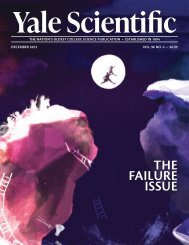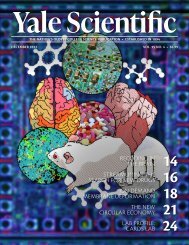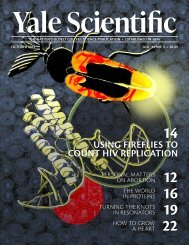YSM Issue 94.2
You also want an ePaper? Increase the reach of your titles
YUMPU automatically turns print PDFs into web optimized ePapers that Google loves.
Medicine
FOCUS
ERAPY FOR DIABETES
e 1 diabetes?
BY ALEX DONG
scale trial did not end up meeting its
target efficacy endpoint, the necessary
threshold to move forward. “When
that happens in the pharma field, it’s
a disaster,” Herold explained. “You’ve
basically turned gold into dirt.”
MacroGenics and Eli Lilly both
abandoned the project in 2010, and
teplizumab was considered a failure.
“There was nobody willing to pick it up,
and we had no support,” Herold said.
Knowing that the drug development
process requires substantial resources,
Herold and his colleagues traveled across
the country and even flew internationally
to Germany in pursuit of funding and
support. Despite teplizumab having
favorable mouse and human trial data,
every company, foundation, or potential
investor declined—for eight years.
Finally, in 2018, Provention, a
biotechnology company founded just
two years prior, decided to take on
teplizumab anew. Herold cites his belief
in the promising science behind the
mechanisms of the drug in humans as a
large motivating factor in his persistence
over the eight long years. “This was
literally dead,” he said. “It just goes to
show you that if you think something
is really worth doing, you [have] got to
stick with it no matter how bad it seems,
because one turn of the tide could make
all the difference in the world.”
In 2019, Herold led a phase II clinical
trial, sponsored by TrialNet, testing the
effectiveness of teplizumab. He found
that it successfully delayed the onset of
type 1 diabetes in high-risk patients by
approximately two years. Herold then
proposed a new question: how does
www.yalescientific.org
teplizumab affect beta-cell function?
“We ask this question all the time in
people who have diabetes, but we really
never had the opportunity to answer it in
people at risk for diabetes,” he explained.
“They don’t yet have the disease, but we
know that they’re going to develop it.”
Delaying the Onset of Diabetes
For Sims, conducting research was not
always a priority. “I always thought I wanted
to be a doctor, and I always loved kids, so I
thought I was going to be a pediatrician,”
Sims said. She found the physiology of
endocrinology interesting and intuitive,
so she decided to specialize in pediatric
endocrinology. She was first exposed to
basic science research during these years.
Almost immediately, the inherent crossapplications
of research and medicine
became apparent. “Working in the lab
gave me this really cool opportunity to
ask questions that were relevant to what
you see in the patients you’re treating,” she
said. Referencing a line from Aaron Burr in
the musical Hamilton, she explained that
research is like “being in the room where it
happens.” In Sims’ many interactions with
children diagnosed with type 1 diabetes,
she witnessed the toll of this disease on her
patients and their families. “When you get
that diagnosis, your life changes,” she said.
Herold and Sims are both involved in the
NIH consortium TrialNet. Sims’ expertise
studying beta-cells and analyzing metabolic
data drew her to join Herold in pursuit
of a better understanding of the effects of
teplizumab on beta-cell function.
In their 2021 study, published in Science
Translational Medicine this March,
Sims and Herold suggested that there
is progressive depletion of beta-cells
in the years preceding type 1 diabetes
diagnosis. During this period, the level
of metabolic dysfunction, which is a sign
of autoimmunity, defines the stages of
the disease. Stage 1 consists of the period
before glucose abnormalities arise; stage 2
makes these abnormalities more evident;
and stage 3 is the typical definition of
diabetes—the phase defined by clinical
presentation of high blood sugar.
Sims and Herold investigated whether
teplizumab would delay stage 3 clinical
diagnosis in seventy-six individuals at
stage 2 of the disease. They found that a
single fourteen-day teplizumab treatment
program could have enduring effects: the
teplizumab group had a median time of
May 2021 Yale Scientific Magazine 17

















